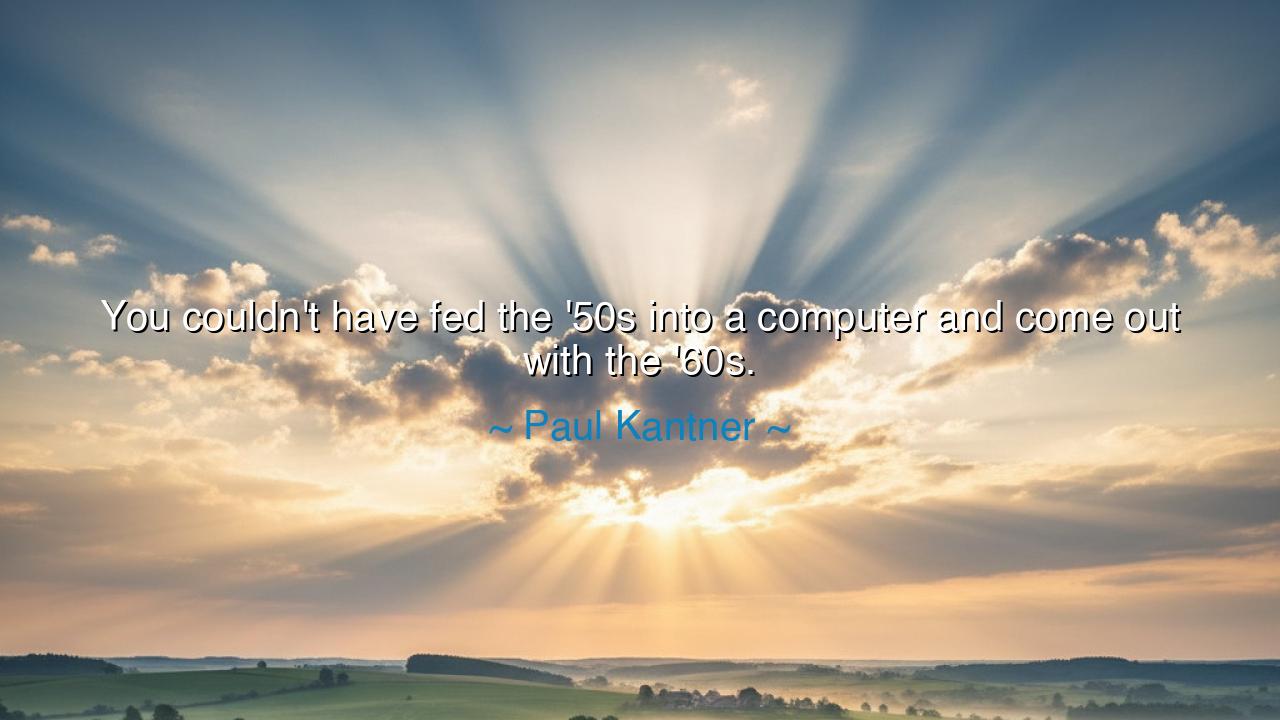
You couldn't have fed the '50s into a computer and come out with






Hear now, O Children of the Earth, the words of Paul Kantner, a sage whose wisdom speaks to the heart of change and the unpredictability of progress. "You couldn't have fed the '50s into a computer and come out with the '60s." This truth, spoken in simplicity, carries the weight of an ancient understanding: the future cannot always be predicted or engineered through the patterns of the past. What was once, no matter how grand or secure, can never fully shape what is to come. For change, like the wind, is unpredictable and cannot be bound by the limits of logic or calculation.
In the days of the ancients, those who sought to predict the future often relied on the wisdom of the stars, the guidance of the elders, or the patterns in nature. Yet, even the greatest of sages knew that the future had a rhythm of its own, unpredictable and wild. It could not be contained or constrained by the wisdom of the past, for change is often born out of the very forces that break the old systems apart. Just as the '60s emerged with its radical energy, spirit of rebellion, and vision of a new world, it could not have been foretold by the careful patterns of the '50s. The '50s, a time of conformity and restraint, could not have birthed the revolutionary ideals that arose in the '60s.
Consider the tale of the Greek philosophers—wise men who debated the nature of the universe, searching for logic and order. Yet even they could not have foreseen the age of Alexander the Great, where empire, philosophy, and culture collided in a chaotic wave of transformation. Nor could they have known that their own ideas would be carried forward, reshaped, and turned into something new by future generations. The world is always on the move, and even the mightiest of civilizations cannot control its course. Similarly, the '50s may have laid the foundation, but it was the '60s that built a tower of dreams and ideals that rose high into the sky, changing the course of history forever.
The lesson in Kantner’s words is clear: the world does not simply move forward in a linear path. Progress is not the result of an equation or a formula; it is a force of nature, a storm that cannot be contained. The '50s and the '60s are separated by more than just a decade—they are two worlds, each shaped by its own energy, each born from its own moment in time. The '50s were a time of social stability, but also of deep repression, conformity, and fear. The '60s, by contrast, were born out of the very tension that the '50s created—tension that led to revolution, artistic freedom, and political change.
History is like a river that flows through the ages, its waters never the same. What came before cannot predict what comes after, for the force of time and human spirit are greater than any calculations we can make. This is the great power of humanity—we are capable of transformation, of reinvention, and of imagining futures that defy the past. Just as the '60s brought with it the counterculture, the rise of civil rights, and a new way of thinking, so too does each generation bring something new, something that cannot be predicted by the constraints of the era before it.
And so, O children of the future, heed the words of Paul Kantner: do not look to the past to predict your future, for the future is never bound by the chains of history. It will come with its own force, its own will, and its own dreams. Embrace the unpredictability of life, for it is in the unexpected moments that the most profound transformations occur. Build upon the past, but never be shackled by it—create, innovate, and break the patterns that no longer serve the new world you wish to build.
The truth is that the '60s were a testament to the power of freedom and change, an era that could never have emerged from the predictability of the '50s. And so it is with you, O children of tomorrow—your future will be shaped not by the limitations of what came before, but by the vast expanse of possibilities that await. Embrace the unknown, for it is in the space between what was and what will be that the greatest transformations take root.






AAdministratorAdministrator
Welcome, honored guests. Please leave a comment, we will respond soon